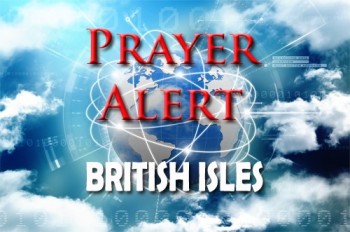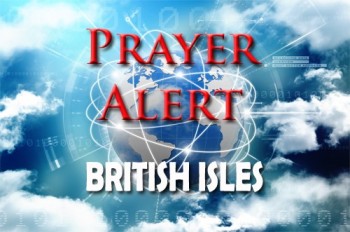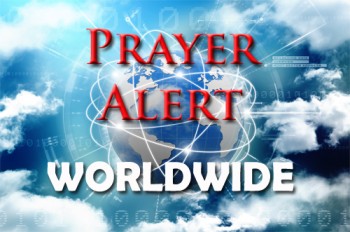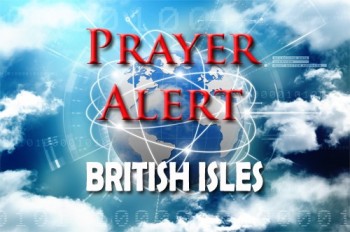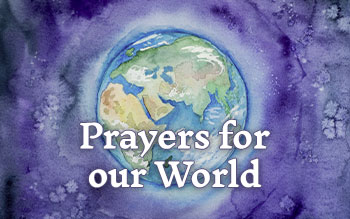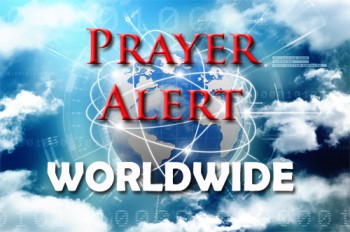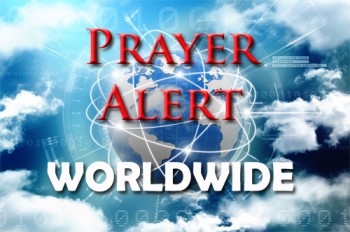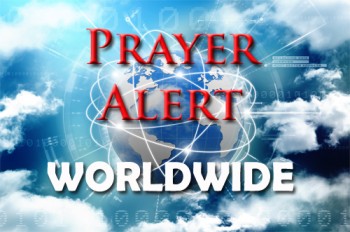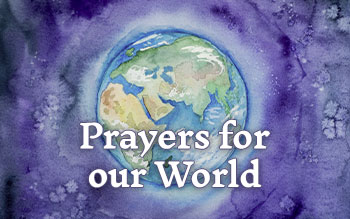Displaying items by tag: church
Mental health: 40 seconds of action
World Mental Health Day was 1 October. This year it was supported by the International Association for Suicide Prevention. Every forty seconds, someone commits suicide. ‘40 seconds of action’ raises people’s awareness of the frequency of suicide, and the role that each of us can play to help prevent it. In the UK one in four adults will have mental health problems at some stage in their lifetime. For every suicide, there are twenty suicide attempts. These have an impact on families, friends, colleagues, communities and societies. Pray for a proactive church to support vulnerable people with mental health challenges wisely. 20% of the UK population will suffer from depression. Pray for more friends, neighbours, and relatives prepared to stand with the sufferers with compassion and support them through their crisis.
GATHER
All over the UK, God has been doing a hidden work through GATHER - a network of over 120 movements in villages, towns and cities across the UK with Christian leaders and churches forming vibrant mission-focused unity movements based on prayer and friendship. These networks are taking the prayer of Jesus seriously: ‘May they be brought to complete unity to let the world know that you sent me’ (John 17:23). Tired of working in isolation from, or in competition with, other churches in their area, these networks are laying aside theological and cultural differences for the sake of reaching their local area with the love of Christ. GATHER is building a growing movement, not an organisation, which encourages and supports unity movements to grow and develop in their prayer, fellowship and missional transformation activities.
Afghanistan, Iran: suffering but growing church
We praise God that hundreds of new Iranian and Afghan believers have been baptised in recent months in cities across the region. In Iran, these include teenagers who were deeply impacted recently by an Elam youth discipleship conference. The baptisms have been occasions of great joy and celebration, often lasting from morning to evening. Over 100 more new believers will be baptised soon at a service in Afghanistan. Please pray that all these new believers will grow in love and knowledge of Christ, and that God will protect them and give them wisdom as they witness to family and friends.
Building relationships
Most British schools reopen on 2 September. During the holidays, three million children were at risk of hunger. One in five children faced food insecurity, one of the highest rates in Europe, because they were no longer receiving a daily school meal. Because of this, a variety of organisations and churches dotted across the nation have been providing free activities and hot and healthy meals to children and families who would otherwise have gone hungry. They have also been supporting and building relationships with the most vulnerable in our communities. Pray for these relationships to continue to grow after the ‘hunger clubs’ close down. Pray for the church volunteers who now have contact with some of the hidden ones in their communities to continue to give families the loving support that a compassionate church can give. Also, 37% of teachers spot malnutrition when children return to school after the holidays. Please pray for sensitive relationships to be built between families in poverty, teachers, social workers, councils, and other agencies able to support the vulnerable. See
Lebanon - Prayers for the Church
Lebanon's name was mentioned 71 times in the Old Testament. Its regions are referred to several times in the New Testament. The Old Testament is full of praise for Lebanon's natural beauty and resources and God's love for men and women is celebrated.
Lebanon's role in the history of salvation becomes even more evident in the writings of New Testament authors. Jesus Christ, the Son of God, visited the Phoenician cities along Lebanon's coast, preached to the people there and healed the sick.
God loves His people and He wants them to be saved. We had a burden for many years to pray continually for Lebanon, we want to see Lebanon transformed to Jesus Christ. Hallelujah.
In Psalm 24:1-2 we read “The earth is the Lord’s, and everything in it, the world, and all who live in it; for he founded it on the seas, and established it on the waters.”
CHURCH:
Pray: for unity between all church denominations in Lebanon (Catholic, Orthodox, Evangelica, etc...) Let every church become a house of prayer leading people to know about Jesus as the only true saviour. Pray for all church leaders, bishops, archbishops, all clergy and lay ministers.
Pray: for the church in Lebanon that Jesus established to be strong. Jesus’ church has stood the test of time. It cannot be stopped by force, political pressure, or even political correctness. Jesus will continue to build His church until He returns in glory to redeem His bride, and absolutely nothing or no one can stand in His way.
Pray: that the Lord God gives His church the spirit of wisdom and revelation in knowledge according to the riches of His glory, for His faithful to be strengthened with might by His Spirit that Christ may dwell in the hearts of His Lebanese people for ever; and that they are rooted and grounded in love. May they be able to comprehend and to know the love of Christ, which passes all knowledge, that they might be filled with all the fullness of God.
Lilian Schmid - Coordinator
Prayer Strategy for the Spheres of Influence
www.prayerstrategy.org
Global Church: confess and pray
A third of the world call themselves ‘Christians’, but many are missing from our churches; others are present, but don’t have the joy of knowing and following Christ. Something has to change! Mission to nominal Christians is missing from the global church agenda. We need to confess and pray: ‘Father, we confess that we have overlooked nominal Christians in society and in our churches. We confess faltering witness, defective discipleship, and lack of concern for those who bear the name of Christ but through ignorance, sin, or rejection are far from the way of Christ and his church. We are quick to judge and slow to listen - especially when they come from a different church tradition. We ask you, Father, to touch the lives of nominal Christians with your powerful Holy Spirit so that they will come to a saving faith in Christ.’
Zimbabwe: governance crisis and church aid
Far from seeing reform after Robert Mugabe was toppled, the country has fallen into deeper crisis as millions are ‘reduced to paupers’. Power cuts from dawn to long after dusk are causing families to cook on firewood in almost total darkness. Monthly earnings barely cover two weeks’ living expenses. With Mnangagwa things have gone from bad to worse with outlandish austerity measures causing 175% inflation. Multiple currencies replaced by another new Zimbabwe dollar, fuel subsidies cut, poor harvests, a cyclone and drought have compounded problems. The Zimbabwe Church is calling for the international community and the government to hear the cries of Zimbabwean families surviving on two meals a day and lacking life-saving medicine. UK aid agency CAFOD is asking for national dialogue, for all in authority to come together and address the current crisis as they do what they can to assist with food, clean water supplies, and seeds (70% of the population grow their own food).
China, Hong Kong: Catholics urge restraint
A proposed bill allowing mainland China to pursue government critics and criminals in Hong Kong and extradite them to China drew protest marches by thousands on 9-11 June, causing a debate on 12 June to be cancelled. The Catholic diocese of Hong Kong joined the social welfare sector and the largest teachers’ union in voicing concerns about the bill. Two thousand counsellors, carers, therapists, and religious groups went on strike. A strike organiser said, ‘We are forced to take a stand on this moral question of right and wrong.’ Several other Christian denominations in Hong Kong also voiced concerns. Police fired rubber bullets and tear gas at protesters, who threw bricks and projectiles back. People are worried that the civil rights and freedoms guaranteed to Hong Kong under the ‘one country two systems’ arrangement will be eroded under the new law. China often uses accusations of non-political crimes to prosecute its critics.
The Staggering Rise of the Church in Iran
Robert Bruce, a Scottish missionary to Iranian Muslims in the late nineteenth century, wrote home to his supporters, “I am not reaping the harvest; I scarcely claim to be sowing the seed; I am hardly ploughing the soil; but I am gathering out the stones. That, too, is missionary work; let it be supported by loving sympathy and fervent prayer.”
For many years, Iran was one of the most difficult regions of the world to reach with the gospel. A significant development occurred in 1979, however, with the Islamic Revolution in Iran. The ruling monarch, Shah Mohammed Reza Pahlavi, was overthrown, and in his place an Islamic Republic was birthed, led by the Ayatollah Khomeini. Sharia law became the law of the land, and Muslim clerics became the heads of state.
Many in those days believed the revolution would lead to a time of flourishing in Iranian society. The new regime made great promises about rights and economic progress, as Iran was finally free from the influence of the West. The laws of man would be replaced by the laws of God, they claimed. Under the Republic, conversion to any other religion was considered apostasy and could be punished with death.
Door Opens
As we near the fortieth anniversary of the Islamic Revolution, however, we see that the prayers of many Christians over the years have been answered, and the climate in Iran is vastly different. The gospel has spread throughout the land in unprecedented fashion despite increased persecution of Christian believers. To use the words of the apostle Paul, “A wide door for effective work has opened . . . and there are many adversaries” (1 Corinthians 16:9).
As of 1979, there were about five hundred known Christians from a Muslim background in Iran. In 2005, it was estimated that there were 40,000 ethnic Iranian Christians (not including ethnic minority Christians who live in Iran). That number grew to about 175,000 Christians in 2010, according to the Joshua Project. Today, the average estimates of Christians within Iran range from 300,000 to upwards of one million, according to some missions experts. Operation World, a missions research organization, continues to list Iran as having the fastest-growing evangelical church in the world. In fact, more Iranians have become Christians in the last twenty years than in the previous 1,300 years, since Islam came to Iran.
Four Reasons for Growth
Several factors have contributed to the rapid growth of the church in Iran. Here are four of the most important.
1. Disillusionment with Islam
Since the time of the revolution, the Islamic regime, which promised much in the way of economic development and freedom, has not delivered. Rather than prosperity and growth, the economy stagnated. The people also have been oppressed — women punished for not covering their hair, and others punished for speaking out freely in protest. As a result, the country has isolated itself further from the rest of the world.
Ironically, because the Islamic Republic in Iran has tied religion and state so closely together, the people’s disappointment with the government has led to great skepticism of Islam. Consequently, Iranians have become increasingly open to hearing the Christian message.
2. Persecution
The rise of persecution against Christians in Iran has served both as a sign of the rapid growth of Christianity within the country and as fuel for further growth. In the 1990s, several key leaders of the church in Iran were killed. One of the most famous martyrs, Mehdi Dibaj, gave a defense before the Islamic courts prior to his death that has become a rallying cry for many Christians in Iran. Dibaj declared,
I would rather have the whole world against me, but know that the Almighty God is with me; be called an apostate, but know that I have the approval of the God of glory. . . .
Life for me is an opportunity to serve him, and death is a better opportunity to be with Christ. Therefore I am not only satisfied to be in prison for the honor of his Holy Name, but am ready to give my life for the sake of Jesus my Lord and enter his kingdom sooner, the place where the elect of God enter to everlasting life.
Examples like this have emboldened the church as the faithful remember the words of Jesus, “Because you are not of the world, but I chose you out of the world, therefore the world hates you” (John 15:19). In 2010, many church planters and leaders were arrested. I had the privilege of visiting with one of these faithful brothers after he served five years in prison. He recounted the moment when he received news that many of his colleagues were being arrested.
Briefly, he considered fleeing. But then he remembered the words of Jesus from John 10, that he is not the hired hand who sees the wolves coming and flees, but he is rather the good shepherd, who lays his life down for his sheep (John 10:11–12). He told me he went home knowing it would lead to his arrest, but he saw prison as an assignment by God to be a ministry post for him to reach many within prison.
This persecution has served to motivate further evangelistic zeal among Iranian Christians. These faithful servants are modern-day examples of Paul, who once wrote, “Most of the brothers, having become confident in the Lord by my imprisonment, are much more bold to speak the word without fear” (Philippians 1:14).
3. The Diaspora and Use of Media
A countless number of Iranian Christians have been scattered around the world. Many of these saints sense a unique calling to continue supporting the work of gospel advancement within Iran from the outside.
The advancement of technology through the Internet and satellite TV has made the Christian message more accessible to Iranians who may have never even met a Christian. The diaspora Christians have been active in broadcasting the gospel and Bible teaching into Iran. In the last decade, social media also has been a powerful tool to reach Iranians and teach them the truths of Scripture.
4. Bible Distribution
Although persecution has not produced the results that the Iranian authorities wanted, they have continued to work hard to stamp out the message of Christianity. The Bible (especially the New Testament) is banned literature in Iran.
But the people have been hungry for the word of God. There have been over two million New Testaments printed in recent years for dissemination in Iran, and about 180,000 entire Bibles have been distributed within the country. As Paul told Timothy, “The word of God is not bound!” (2 Timothy 2:9).
Three Ways to Pray
These are some factors that have contributed to the rapid growth of the church in Iran. But ultimately, the kingdom of Christ is spreading within Iran because God’s Spirit is moving powerfully. Though there has been great progress, the need for prayer and support continues to be great. Would you join me in praying for Iran — its people and leaders? Here are three ways you can pray for the church.
1. Courage
Although the number of house churches and believers is growing every day, the opposition continues. Iranian Christians continue to be arrested and charged with acting against national security. House churches continue to meet secretly while shifting their meeting times and locations to stay undetected. Christians continue to evangelize, knowing they are putting their lives at risk.
2. Unity
Since most of the activity of the church is done secretly, the Christians are isolated from each other. Iranian leaders are forced to work covertly and therefore apart from each other. Security concerns make collaborative efforts difficult, even among ministries outside of Iran that work within the country. All of this creates obstacles for unity.
3. Trained Leaders
The nature of the underground church is such that, many times, house-church leaders are unqualified and untrained, and sometimes, there is no pastor in the group and the gathered believers are being fed solely through satellite TV. Some of the teaching that the church absorbs is not sound theology. Iranians don’t have the same access to Christian literature and training as many believers do throughout the rest of the world. There are ministries who are already working hard to meet this need by making quality training available for leaders, and we need to pray for this work.
These words of Jesus may sum up the situation best in Iran: “The harvest is plentiful, but the laborers are few; therefore pray earnestly to the Lord of the harvest to send out laborers into his harvest” (Matthew 9:37–38). Let’s pray the Lord of the harvest continues to send his laborers throughout Iran, so that millions more Iranians find forgiveness, peace, and the hope of glory through the gospel of Jesus Christ.
Article by Afshin Ziafat, Pastor, Frisco, Texas - (@afshinziafat) is lead pastor of Providence Church in Frisco, Texas. His passion is to teach the word of God as the authority and guide for life, to preach Jesus Christ as the only Savior and Redeemer of mankind, and to proclaim the love of Christ as the greatest treasure and hope in life. He and his wife, Meredith, currently reside in Frisco with their three children.
Bosnia: Prayer for the Church
Churches Led by the Holy Spirit - Before Jesus went up to heaven, he told his disciples to wait in Jerusalem for the promise of the Father - the Holy Spirit. They did, and it was by the power of the Spirit that the very first movement to Christ began. 3,000 were baptized in one day, with believers added daily.
Again and again throughout the book of Acts we see the Holy Spirit initiating, empowering, and leading the early church. By the Holy Spirit, the disciples proclaimed the gospel fearlessly. They were empowered by the Spirit to speak boldly in the face of imprisonment, courts, opposition, and even death. Yes, and it was through the leading of the Holy Spirit that the church sent out the first people to take the gospel where it was not known.
Likewise, as we pray for a movement in Bosnia of disciples making disciples, we long to see churches following that very first model of being led by the Holy Spirit.
But you will receive power when the Holy Spirit has come upon you, and you will be my witnesses in Jerusalem and in all Judea and Samaria, and to the end of the earth. Acts 1:8
Going Before the Father:
- Pray for the Holy Spirit to stir and convict souls in this nation— and that the result would be commitment to Christ.
- Pray for those who know Christ and those who will soon come to him, that they will live empowered and emboldened by the Spirit in their daily lives.
- Pray that obedience to the Holy Spirit would be central to new churches as they form.
